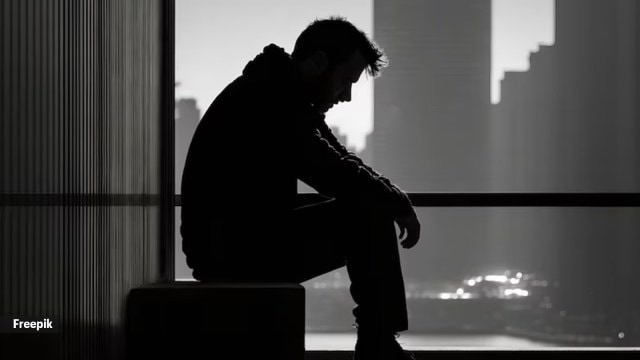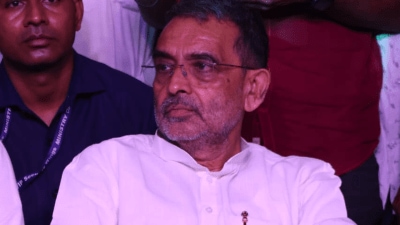📣 For more lifestyle news, click here to join our WhatsApp Channel and also follow us on Instagram
India’s loneliness crisis explained: Why Gen Z is feeling more isolated than ever
Why is the most digitally connected generation feeling isolated? Gen Z Indians reveal the reasons behind the rising cases of loneliness and the impact it has on their wellbeing
 “While I attempt to distract myself with various activities, there are occasions when I find myself free and still plagued by these feelings. Overthinking makes it worse,” reveals 23-year-old public relations professional Pratibha Sahu (Source: Freepik)
“While I attempt to distract myself with various activities, there are occasions when I find myself free and still plagued by these feelings. Overthinking makes it worse,” reveals 23-year-old public relations professional Pratibha Sahu (Source: Freepik)India, a country with one of the world’s youngest populations, is aware of the potential and influence of Generation Z or ‘Zoomers’. Considered one of the most evolved generations, it is the first cohort to grow up in the digital age — where the world witnessed rapid technological advancements. People belonging to this age group are highly independent, tech-savvy, and socially aware individuals.
Gen Z-ers today have made a mark for themselves by becoming young achievers in several fields, not only at the national level but also at the global. Amid all the success stories and the excitement for the next big development in the tech world, however, several accounts are less talked about. Among them is what experts have termed the ‘loneliness epidemic’. Described as the profound feeling of isolation, it has taken over the lives of many young Indians.
Recent surveys and statistics paint a grim picture of this crisis. According to The World Health Organization (WHO), approximately 10% of adolescents are lonely. Additionally, a 2021 global survey by Ipsos revealed that 4 in 10 urban Indians (43%) said they felt lonely and friendless at most times, especially after the Covid-19 pandemic.
“Despite a lot of Gen Z people having friends and socialising, they may still feel lonely. Loneliness may not be a simple lack of connections, but a lack of emotionally fulfilling connections,” asserts Malika Chandra, psychotherapist, MC Psychotherapy.
Root causes of loneliness among Gen Z
A 2020 study published in The International Journal of Indian Psychology suggests that in recent years, family and community dynamics have drastically changed. It states, “Earlier, India had a strong social structure at its place. Joint families, strong bonding with neighbours and relatives, leisure time activities which strengthen the bond even stronger, grand and joint celebration of various festivals, visiting relatives on vacations and living there for a week or two, and many other practices were in place which created an environment where ‘loneliness’ could hardly be thought of.”
As such, loneliness among the youth can be attributed to several factors. Dr Vijayshree Bajaj, psychologist and mental well-being coach at MedyMind, mentions that while social media platforms provide a sense of connection, they can also contribute to loneliness by fostering shallow relationships and unrealistic comparisons. “Gen Z often experiences FOMO (fear of missing out) and may feel inadequate when comparing their lives to idealised versions presented online. Technology has made constant connectivity possible, but it lacks the quality and depth of face-to-face interactions,” she adds.
Additionally, Gen Z faces immense pressure to excel academically, leading to a lack of time for social interactions and leisure activities from a very young age. This constant focus on achievement can result in feelings of isolation and disconnect from peers. Traditional family structures are evolving, Dr Bajaj says, with many Gen Z individuals experiencing dual-income households, single-parent families, or living away from extended family members due to various circumstances. This can also lead to reduced emotional support and a sense of loneliness.
Further, despite growing awareness, particularly in India, she agrees, there is still a stigma surrounding mental health issues in India. Gen Z may hesitate to seek help for feelings of loneliness or anxiety, further exacerbating their sense of isolation.
Unlike just a few decades ago, the traditional community and societal structure have broken down, leading to a lack of meaningful connections. “With a focus on digital communication, Gen Z may have fewer face-to-face interactions and meaningful conversations. This, too, can lead to a sense of disconnectedness and loneliness despite being constantly connected online,” Dr Bajaj discloses.
 Loneliness epidemic – a profound feeling of isolation from everyone – has taken over the lives of many young Indians (Source: Freepik)
Loneliness epidemic – a profound feeling of isolation from everyone – has taken over the lives of many young Indians (Source: Freepik)
What do Gen Z Indians have to say about feeling lonely?
When we spoke to young individuals who have experienced loneliness, almost all of them blamed Covid lockdowns for making them feel particularly lonely or disconnected from others. “I started feeling really isolated, especially during COVID but even a bit before that. But when the lockdown hit, it was like the loneliness peaked,” admits Aashna Gurav, brand management and marketing consultant.
Gurav adds that societal pressures, such as academic expectations or career goals, have impacted her sense of connection with others. “Our generation has faced immense pressure, whether it’s excelling academically or chasing professional milestones. It’s like a relentless race we can’t escape.” Seeing 19-year-old billionaires making headlines, she feels that the pressure is very high. “The older generation is leading us at workplaces. They’re not as sensitised about things like work-life balance,” she continues.
“While I attempt to distract myself with various activities, there are occasions when I find myself free and still plagued by these feelings. Overthinking makes it worse,” reveals 23-year-old public relations professional Pratibha Sahu. To help get rid of feelings of isolation, she has begun prioritising face-to-face interactions and building physical networks. While social media platforms offer updates on others’ lives, she admits, they often exacerbate feelings of loneliness by fostering a sense of inadequacy through constant comparison and perseverance of other life updates through their posts.
A content writer, 27, based in Delhi says that he believes that there’s a decent level of awareness about mental health challenges, including loneliness, especially within this generation due to increased education and the influence of social media. But within the larger society, there is scope for improvement. “Despite the growing awareness, many still suffer in silence, hesitant to acknowledge their struggles due to fear of judgment or societal stigma. The support systems exist, but they remain underutilised and overshadowed by the prevailing culture of silence,” he emphasises.
Impact of loneliness on mental health
Prolonged loneliness has been linked to a multitude of other psychological and surprisingly, physical illnesses as well. “This ranges from depression and anxiety to diabetes,” Chandra discloses, adding that on another level, prolonged loneliness can also reduce positive resources within a person over time, making it harder to counter the negative effects of loneliness.
Celebrity life coach Prasidhi Aneja reflects on the struggles of Gen Z with asking for help due to their tendency to act like they have all the answers, which can compound their confusion. “Social isolation is as harmful as smoking up to 15 cigarettes a day and can lead to health problems or substance abuse,” she warns.
Dr Rahul Chandhok, head psychiatrist and head consultant, Mental Health and Behavioural Science at Artemis Hospitals asserts that untreated loneliness during young adulthood can have significant long-term consequences on overall mental health and functioning as individuals transition into adulthood. It contributes to the development or exacerbation of chronic mental health disorders like depression, anxiety, and substance abuse disorders. He continues, “These conditions can persist into adulthood and have a significant impact on daily functioning, relationships, and overall well-being.”
If loneliness is left unchecked for a long time, Aneja shares, it can lead to various emotional, behavioural, and health issues. One common problem she focuses on is insomnia, where people struggle to get enough sleep leading to symptoms of depression, such as extreme fatigue and difficulty concentrating.
What are some solutions to better support individuals struggling with loneliness?
When it comes to feelings of loneliness, it is important to understand and empathise with what Gen Z is going through. The rapid expansion of technology, socio-cultural changes, rise of social media, Covid lockdown, independence, and an increased pressure to excel in their careers as well as the workplace have all contributed to feelings of seclusion from loved ones as well as the society at large.
Aneja recommends that it is crucial to acknowledge the challenges faced by Gen Z and accepting these issues opens the door to trying various strategies and seeking therapeutic help. Chandra concurs, adding that including mental health education in school would be a great start. “There also must be education on the proper use of social media and its limitations to providing social connection. We must encourage more organic and authentic strategies of forming connections,” she remarks.
Dr Bajaj asserts the crucial role that families can play. “Strong family dynamics and parental involvement provide essential emotional support for young individuals. Knowing they have a supportive family to turn to can alleviate feelings of loneliness and foster a sense of belonging.”
Furthermore, Dr Chandhok urges employers to encourage a culture that values work-life balance by offering flexible work arrangements, promoting regular breaks, and discouraging long working hours. Giving employees’ space for their personal lives will contribute to their overall well-being and reduce feelings of stress and burnout, fostering a sense of fulfillment in the long term.
📣 For more lifestyle news, click here to join our WhatsApp Channel and also follow us on Instagram





- 01
- 02
- 03
- 04
- 05























